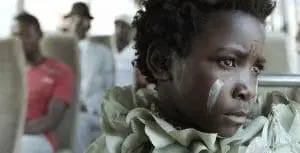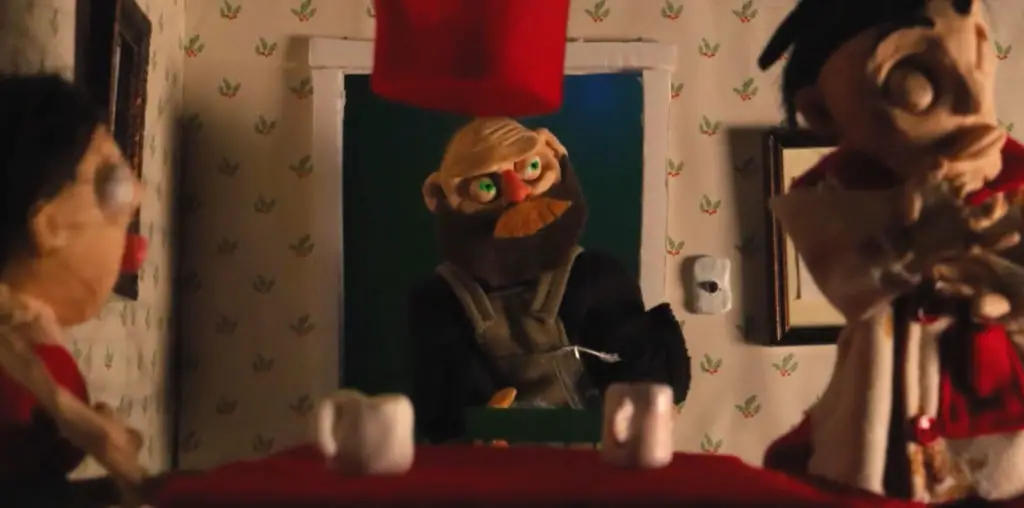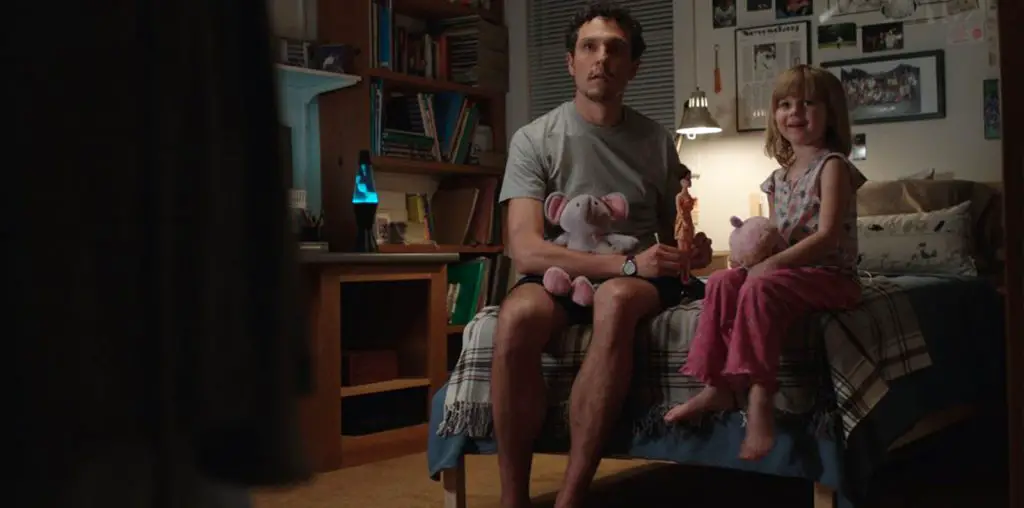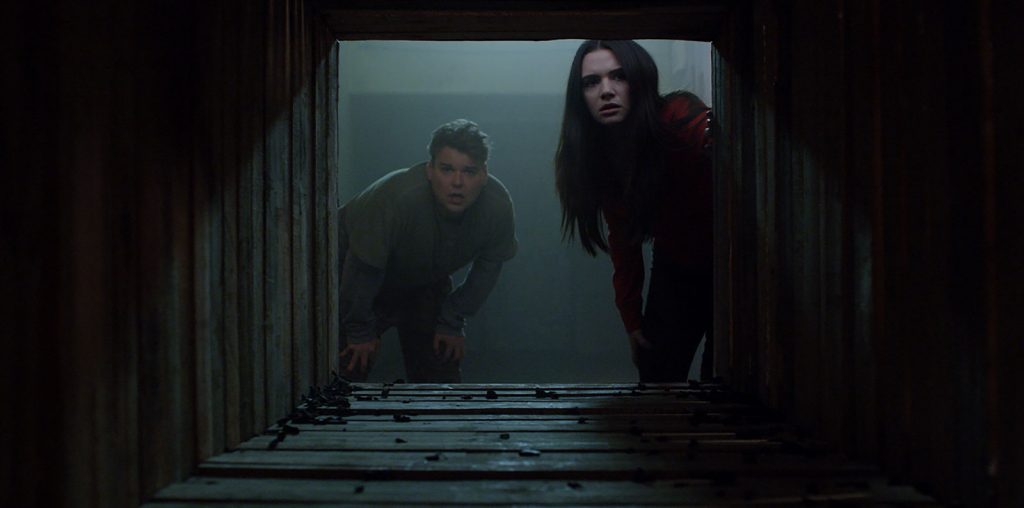
Superstition and good, old-fashioned subjugation are the driving forces in I Am Not a Witch, a film that can be surprisingly rousing and entertaining given its extraordinarily grim-sounding subject matter.
It’s not often that a movie in which an innocent child is victimized by an inhumane and oppressive system can, for a large portion of its running time, provoke wry smiles as much as it does righteous indignation. Somehow, though, Zambian-born writer/director Rungano Nyoni, revisiting the country of her birth in her feature debut, achieves exactly that – right up until to the point when she pulls the rug out and leaves viewers dumbstruck with the underlying senselessness of what they’ve seen. Nyoni’s handling of tone is astoundingly careful, and because of it, I Am Not a Witch is a truly unique and stirring experience.

“…surprisingly rousing and entertaining given its extraordinarily grim-sounding subject matter.”
The film’s 8-year-old protagonist, who comes to be named Shula (it means “uprooted one”), is an orphaned girl in a rural village whose superstitious residents regard her with a kind of contemptuous loathing. An innocuous encounter with one of the villagers leads to Shula being accused of witchcraft, and she’s brought to a local police precinct to – confess that she’s a witch? Deny it? Prove, somehow, that she has supernatural powers?
The ersatz “witch trial” that immediately follows is one that’s reminiscent in its incredulous mockery and its logical absurdities of the similar sequence in Monty Python and the Holy Grail. It’s here that Nyoni fully establishes an engagingly offbeat tone that carries through for most of the film; it’s pitched on a knife-edge of surrealism and satire throughout, but things never devolve so far into outrageousness that we lose sight of or sympathy for the very real-seeming child at its center.
Found “guilty” by way of a ritual that involves a witch doctor and a beheaded chicken, Shula (Margaret Mulubwa) is sent to a “witch camp” to live among a group of women – all of whom look old enough to be her grandmother – who have also been designated as witches. This community of witches isn’t subjected to the kind of torture and execution favored by the puritanical American tradition, but instead, the local government puts them on display for tourists, forces them into menial farm labor, and occasionally asks them to adjudicate local criminal matters by using their “powers” to single out a perpetrator from a group of suspects. They’re also – in one of the film’s most striking touches – each restrained at all times by a thick ribbon on a spool; said by the locals to prevent the witches from flying away and killing people, the ribbons also, of course, serve as an obvious but perfect visual metaphor for the way they’re constantly controlled and suppressed.
Much of I Am Not a Witch consists of episodic vignettes in which Shula comes to understand and adjust to her bizarre circumstances, gradually forming a bond with the older women as she endures the strange and often degrading realities of their day-to-day existence. Mulubwa, who has no other film credits to her name, is a revelation, delivering an understated and naturalistic performance that’s well beyond the capacity of the average child actor. Though Shula is a soft-spoken and largely passive character, her face is remarkably expressive in the way it seems to reflect rather than outwardly react to what’s going on around her (she cries once, just a little, and it’s an absolutely shattering moment).
She’s especially compelling in her dealings with Mr. Banda (Henry B.J. Phiri), the bumbling government bureaucrat who oversees the witch community and sees in Shula a way to curry favor with his superiors and move up the political food chain. In a more simplistic telling of this story, the character might be a detestable villain, but Phiri’s rather likably goofy demeanor, and the small but incisive ways in which Shula is able to gain the upper hand over Banda, give these sequences a comedic edge that makes them one of the high points of the film.

“Mulubwa, who has no other film credits to her name, is a revelation…”
For all its brilliant moments, though, I Am Not a Witch is not a perfect film, and it could certainly take a bit more time and space to develop the relationship between Shula and the tight-knit band of witch-women that she finds herself in the midst of. The glimpses we get of this dynamic are well-handled, but these characters and their connection with the newcomer to their circle are too interesting to not flesh out more fully.
That’s only a slight misstep, though, and really, it speaks more to Nyoni’s ability to captivate viewers with her storytelling than it does any real shortcoming in her craft. Credit is also due to cinematographer David Gallego, who keeps up a steady stream of memorable images from the film’s opening moments to its ambiguous, beautiful closing shot – though, for sheer absurdist loveliness, nothing can quite compete with our first look at the flatbed truck used to cart around both the witches and, of course, their many spools of ribbon.
That stunning piece of production design is unlikely to be forgotten by viewers of I Am Not a Witch, and rightly so. Nyoni’s film isn’t really much about witchcraft at all – any hints she gives that Shula might be supernaturally gifted can be explained away as coincidence or wishful thinking – but, rather, it serves as a disquieting parable about the ways in which societies can take advantage of women and what makes them special. The truck, the spools, the ribbons – they’re just concrete manifestations of intangible but troubling things that do exist, and certainly not just in the place where this film is set. To see it all through young Shula’s eyes, in both its humorous foolishness and its quiet devastation, is powerful stuff, indeed.

I Am Not a Witch (2017) Written and directed by Rungano Nyoni. Starring Margaret Mulubwa, Henry B.J. Phiri, Nancy Mulilo, Margaret Sipaneia, John Tembo.
4 ½ out of 5 stars


